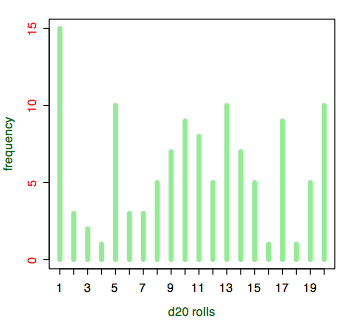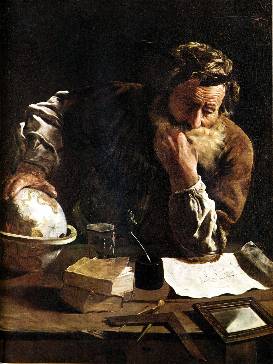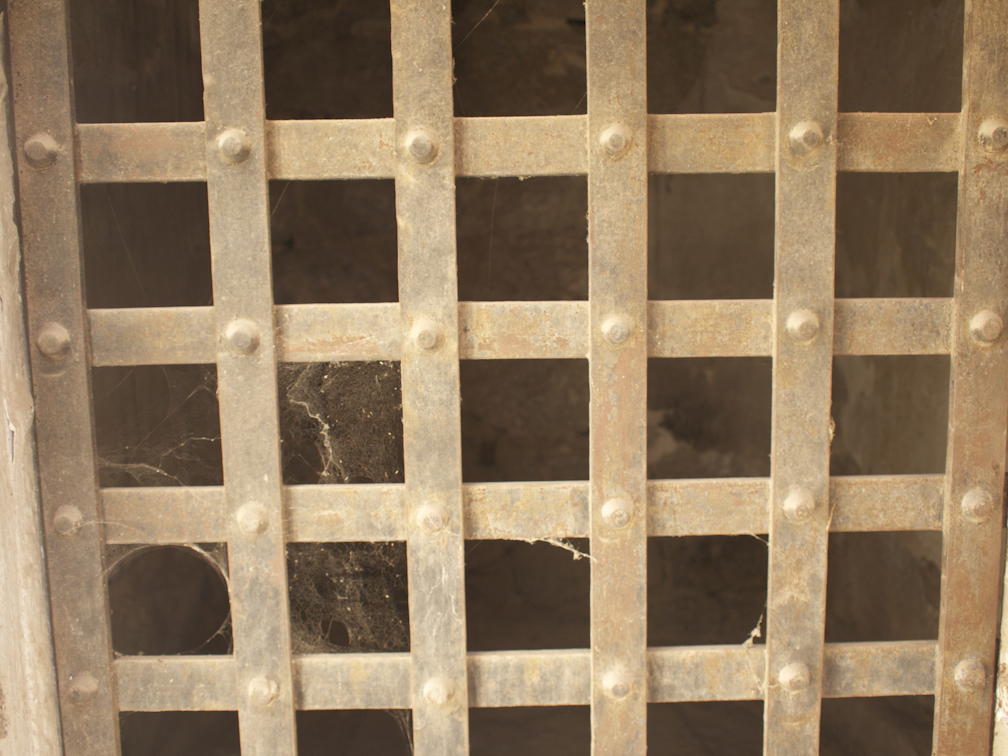Negative Space: Best of Biblyon
- Are my dice random?
-
 My d20 appears to have been rolling a lot of ones, a disaster if I were playing D&D but a boon for Gods & Monsters. Is my die really random, or is it skewed towards a particular result? Use the ‘R’ open source statistics tool to find out.
My d20 appears to have been rolling a lot of ones, a disaster if I were playing D&D but a boon for Gods & Monsters. Is my die really random, or is it skewed towards a particular result? Use the ‘R’ open source statistics tool to find out.
- Experience and Advancement in Role-Playing Games
- Kill monsters. Take their stuff. How has character advancement in role-playing games changed over the years? Starting with original D&D and on up through a handful of modern games, I’ll be surveying methods of experience and character advancement over the years.
- Populating England
- Use the history of England as an example of how to steal ideas from real history for your game world.
- Secular Humanist Pantheon
-
 The Secular Humanist cult, while often oppressed, attracts intelligent, creative worshippers who subscribe to a rich and storied mythology. It will make a great addition to your role-playing game alongside more commonly-role-played mythologies such as Christianity, Buddhism, and Bokonism.
The Secular Humanist cult, while often oppressed, attracts intelligent, creative worshippers who subscribe to a rich and storied mythology. It will make a great addition to your role-playing game alongside more commonly-role-played mythologies such as Christianity, Buddhism, and Bokonism.
- Spotlight on: Evil
-
 No one considers themselves Evil. So how does the Evil moral code relate to the game of Gods & Monsters? How and why do Evil non-player characters act?
No one considers themselves Evil. So how does the Evil moral code relate to the game of Gods & Monsters? How and why do Evil non-player characters act?
- Why do we need open source games?
- If game rules cannot be copyrighted, and if compatible supplements require no permission, what is the point of an open content game book? Over the next three installments, I’ll look at how open content licenses can make for better gaming.
- The Yuma Territorial Dungeon
-
 The Yuma Territorial Prison looks like a great dungeon setting. It’s history provides inspirational ideas for more fantastic dungeons.
The Yuma Territorial Prison looks like a great dungeon setting. It’s history provides inspirational ideas for more fantastic dungeons.
 My d20 appears to have been rolling a lot of ones, a disaster if I were playing D&D but a boon for Gods & Monsters. Is my die really random, or is it skewed towards a particular result? Use the ‘R’ open source statistics tool to find out.
My d20 appears to have been rolling a lot of ones, a disaster if I were playing D&D but a boon for Gods & Monsters. Is my die really random, or is it skewed towards a particular result? Use the ‘R’ open source statistics tool to find out. The Secular Humanist cult, while often oppressed, attracts intelligent, creative worshippers who subscribe to a rich and storied mythology. It will make a great addition to your role-playing game alongside more commonly-role-played mythologies such as Christianity, Buddhism, and Bokonism.
The Secular Humanist cult, while often oppressed, attracts intelligent, creative worshippers who subscribe to a rich and storied mythology. It will make a great addition to your role-playing game alongside more commonly-role-played mythologies such as Christianity, Buddhism, and Bokonism. No one considers themselves Evil. So how does the Evil moral code relate to the game of Gods & Monsters? How and why do Evil non-player characters act?
No one considers themselves Evil. So how does the Evil moral code relate to the game of Gods & Monsters? How and why do Evil non-player characters act? The Yuma Territorial Prison looks like a great dungeon setting. It’s history provides inspirational ideas for more fantastic dungeons.
The Yuma Territorial Prison looks like a great dungeon setting. It’s history provides inspirational ideas for more fantastic dungeons.